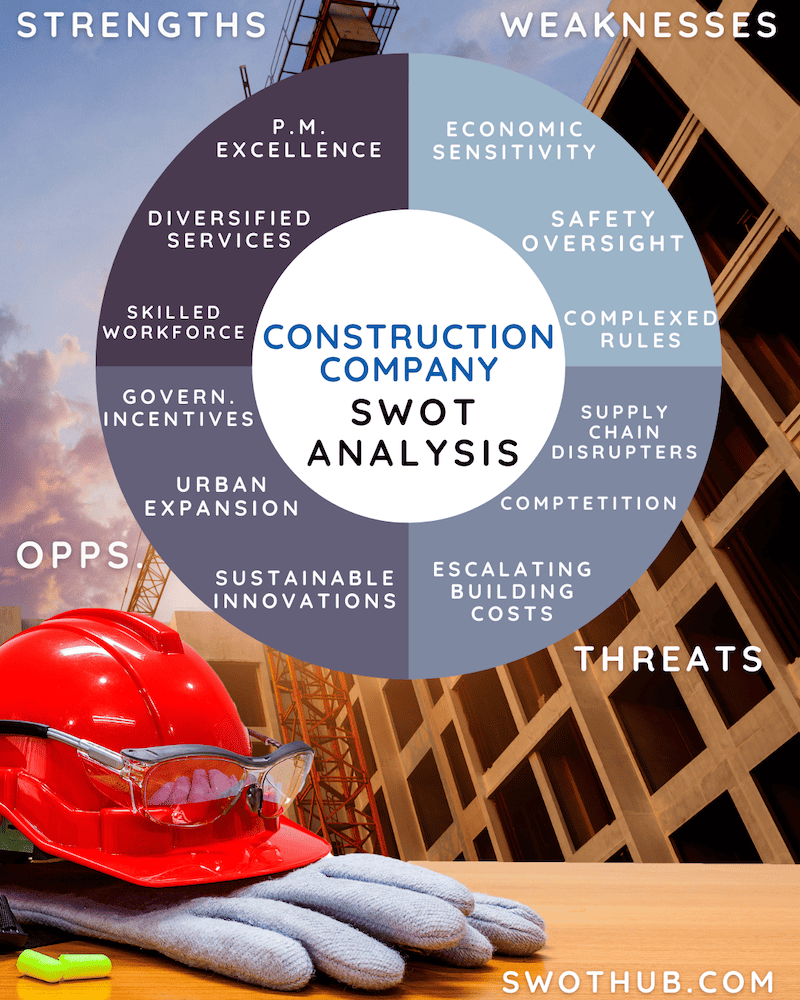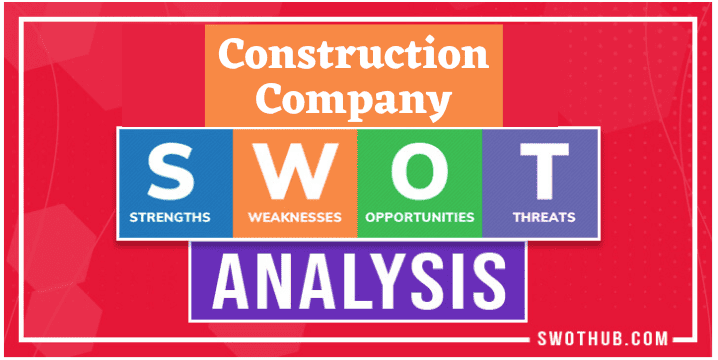The appeal of running a construction company entices entrepreneurs who want to turn blueprints into reality. In a construction company SWOT analysis, we look at what important factors go into making a successful business and what pitfalls to avoid. Construction history is a story of creation and advancement, accompanied by the obstacles of project complications. If you’re considering getting into the construction industry, first take a look at the strengths, weaknesses, opportunities, and threats that could lie ahead.
If you’re an architect, stakeholder, or engineer, take a look at our Architectural SWOT Analysis for Site selection here.
Table of Contents
History of the Construction Company Industry
Historically, owning a construction company provided a road to financial success by laying physical foundations. However, issues such as budget overruns and regulatory complexities highlight the importance of strategic thinking. A detailed understanding of the dynamics of a construction company SWOT analysis is required to successfully understand the full scope.
Construction Company SWOT Analysis:
Uncovering the layers of a construction company SWOT analysis shows a strategy for success in this domain. This strategic assessment has the potential to provide useful information to builders, developers, architects, and general contractors.
Construction Company SWOT Analysis Strengths:
The areas where an industry excels above average or in a manner that distinguishes it from its rivals are its strengths. A construction company’s strengths are outlined in this SWOT analysis. Some of its strengths compared to competitors include:
Expertise and Skilled Workforce: The ability of a construction company’s workforce—its architects, engineers, and craftsmen—to execute projects to the highest standard determines the value of the company.
Service diversification: Offering a wide range of residential, business, and infrastructural services broadens income sources and reduces reliance on a particular market sector.
Excellence in Project Management: Understanding project management concepts supports timely delivery, cost control, and stakeholder satisfaction.
Technical Advantage: Leveraging technical breakthroughs such as Building Information Modeling (BIM) improves precision and reduces rework, distinguishing firms. In a construction company SWOT analysis, this strength can set them above their direct construction competitors.
Company SWOT Analysis Weaknesses:
The weaknesses of an industry are those that limit its potential, make it less competitive, and prevent it from achieving its goals. In a SWOT analysis of a construction company we will look at some of their weaknesses compared to competitors, including:
Economic Sensitivity: The fate of construction is intertwined with economic cycles, making enterprises subject to downturns that affect project funding and demand.
Skilled worker shortages: A shortage of skilled workers can cause project timetables to be disrupted, costs to rise, and growth potential to be hampered.
Regulatory Complexity: Navigating complex regulations and securing approvals can cause project delays and cost overruns.
Safety Oversight: Ignoring site safety issues jeopardizes worker well-being and exposes organizations to legal liability. In a construction company SWOT analysis, consideration of hiring staff dedicated to just safety oversight is suggested.

Construction Company SWOT Analysis Opportunities:
It’s important to look at how a construction company can rise above its competitors. Here are several opportunities that a construction company should focus on when thinking of opening a construction company.
Sustainable Innovations: As the world shifts toward more environmentally friendly methods, chances for green construction and LEED-certified projects emerge.
Technology Integration: Adopting smart technologies like IoT devices and automation boosts efficiency, data-driven decision-making, and project outcomes. For small construction companies, you’ll need to consider hiring or sub-contracting a technology consultant to ensure your business is adopting the latest technology.
Infrastructure Development: Government investments in infrastructure projects provide opportunities for construction firms to contribute to societal development, according to a construction company SWOT analysis.
Urban Expansion: Urbanization patterns drive demand for new buildings, from skyscrapers to community spaces, moving the industry forward.
SWOT Analysis of a Construction Company Threats:
Threats pose a risk to every industry’s stability and profitability. Here are threats that could hinder a construction project’s success and are important to examine.
Supply Chain Disruptions: Global events and material shortages can cause delays and cost changes in the supply chain.
Escalating Costs: Unpredictable changes in material pricing, labor pay, and energy costs have an effect on profit margins and project feasibility.
Competitive Landscape: The competitive nature of the construction industry requires differentiation via quality, innovation, and reputation. For new and up-and-coming construction companies, consider hiring a PR or marketing consultant to get your name out into the public for future business and awareness.
Technical Vulnerabilities: As technology progresses, cybersecurity threats endanger important project data and communication integrity.
Who are the construction company’s competitors?
In the fast-paced world of building, rivals appear from all directions, each fighting for a piece of the pie. To flourish in this volatile environment, construction companies must not only identify their competitors but also execute methods to protect their business. Let’s take a look at the competition and see how you can strengthen your building business.
- Other local construction companies: Direct local competitors frequently share target markets and projects. To leverage your unique offerings, analyze their strengths and limitations.
- National and international players: Large-scale construction firms with a larger geographic reach may pose a danger. To counteract their impact, use your agility and local knowledge.
- Specialized niche construction companies: Competitors specializing in certain areas, such as sustainable building or historic repairs, might carve out their own market share.
- Integrated Real Estate Developers: Companies that manage the full development process, including design, building, and property management, may compete.
Construction Company SWOT Analysis – Conclusion and Recommendations:
Entering the construction industry necessitates a thorough understanding of its SWOT dynamics. While obstacles abound, opportunity abounds for those who navigate them strategically. The construction canvas awaits, promising to shape skylines and communities while welcoming tomorrow’s imaginative builders.
- Embrace technology: Use construction technology to streamline procedures and improve project management.
- Skills Investment: To combat labor shortages, cultivate a skilled workforce via training and development.
- Diversified Portfolio: Balance project types to lessen company risk and alleviate economic swings.
- Risk Mitigation: Identify and manage any risks ahead of time to ensure project timelines and budgets are met.
The opportunity to shape skylines and communities comes with owning a construction company. You can negotiate the intricacies, capture opportunities, and build a successful legacy in this dynamic industry armed with insights from a full construction company SWOT analysis.
FAQs for the Construction Company Industry:
Is running a construction business profitable?
Yes, running a construction business can be profitable, but success depends on factors like effective project management, accurate cost estimation, market demand, and competitive pricing. It requires a strategic approach, quality execution, and adapting to industry trends.
What type of construction business is most profitable?
The profitability of a construction business varies based on factors such as location, market demand, and expertise. Residential, commercial, and infrastructure projects each have their own potential for profit. Specializing in niches like luxury homes, green construction, or renovations can also yield high returns.
Which contractor makes the most money?
The earning potential of contractors varies widely. General contractors overseeing large-scale projects can earn substantial profits, while specialized contractors like electrical, plumbing, or HVAC experts also have lucrative opportunities. Success depends on skill, reputation, project complexity, and effective management.





